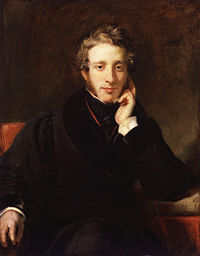Edward Bulwer
|
The Right Honourable The Lord Lytton PC |
|
|---|---|
 |
|
| Secretary of State for the Colonies | |
|
In office 5 June 1858 – 11 June 1859 |
|
| Monarch | Victoria |
| Prime Minister | The Earl of Derby |
| Preceded by | Lord Stanley |
| Succeeded by | The Duke of Newcastle |
| Personal details | |
| Born |
25 May 1803 London |
| Died | 18 January 1873 (aged 69) Torquay |
| Nationality | British |
| Political party |
Whig Conservative |
| Spouse(s) |
Rosina Doyle Wheeler (1802–1882) |
| Alma mater |
Trinity College, Cambridge Trinity Hall, Cambridge |
Edward George Earle Lytton Bulwer-Lytton, 1st Baron Lytton PC (25 May 1803 – 18 January 1873), was an English novelist, poet, playwright, and politician. He was immensely popular with the reading public and wrote a stream of bestselling novels which earned him a considerable fortune. He coined the phrases "the great unwashed", "pursuit of the almighty dollar", "the pen is mightier than the sword", "dweller on the threshold", and the well-known opening line "It was a dark and stormy night".
Bulwer-Lytton was born on 25 May 1803 to General William Earle Bulwer of Heydon Hall and Wood Dalling, Norfolk and Elizabeth Barbara Lytton, daughter of Richard Warburton Lytton of Knebworth, Hertfordshire. He had two elder brothers, William Earle Lytton Bulwer (1799–1877) and Henry (1801–1872), later Lord Dalling and Bulwer.
When Edward was four his father died and his mother moved to London. He was a delicate, neurotic child and was discontented at a number of boarding schools. But he was precocious and Mr Wallington at Baling encouraged him to publish, at the age of fifteen, an immature work, Ishmael and Other Poems.
In 1822 he entered Trinity College, Cambridge, where he met John Auldjo, but shortly afterwards moved to Trinity Hall. In 1825 he won the Chancellor's Gold Medal for English verse. In the following year he took his B.A. degree and printed, for private circulation, a small volume of poems, Weeds and Wild Flowers.
He purchased a commission in the army, but sold it without serving.
...
Wikipedia
